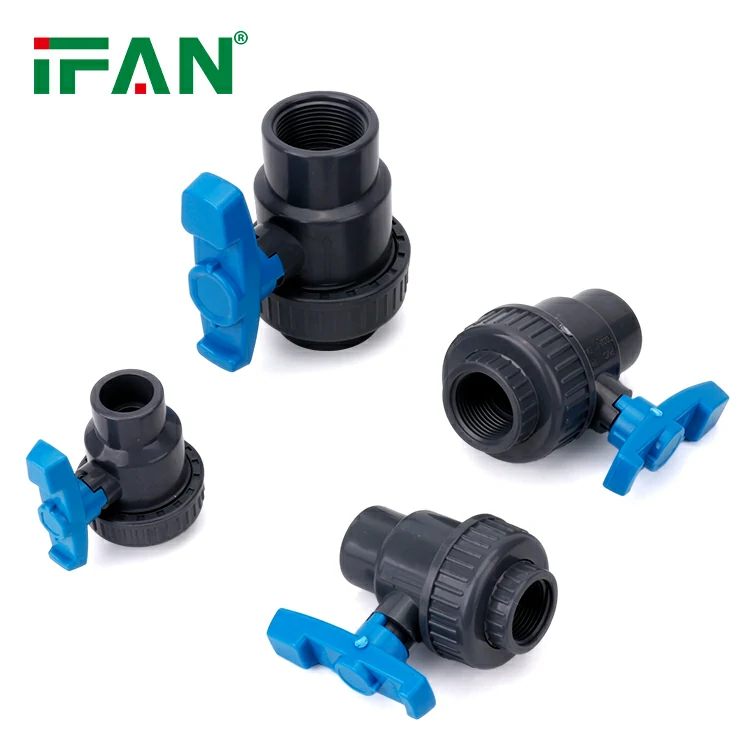A PVC Single Union Ball Valve is a type of valve made from Polyvinyl Chloride (PVC) plastic, designed to control the flow of liquids or gases through a piping system. It uses a ball mechanism to regulate flow and features a single union connection, which allows one end of the valve to be easily disconnected for installation or maintenance.
Here’s a breakdown of the key features:
1. Ball Valve Mechanism:
- The ball inside the valve has a hole or port through it. When the ball’s hole is aligned with the pipe, fluid can flow through; when the ball is rotated 90 degrees (perpendicular to the pipe), the hole is closed off, stopping the flow.
- This mechanism provides a simple and reliable method of controlling flow, allowing for quick and precise operation.
2. Single Union Connection:
- A union is a type of connection that allows one side of the valve to be detached from the piping system, making installation and removal easier.
- The single union design means only one end of the valve has the removable connection, while the other end is typically fixed, which is common for valves in compact spaces or where easy disconnection isn’t always needed.
3. PVC Construction:
- PVC (Polyvinyl Chloride) is a lightweight, durable, and corrosion-resistant plastic, making it ideal for water, chemical, and wastewater applications. It’s also resistant to environmental factors like UV radiation (though UV-resistant variants are needed for outdoor use) and chemicals.
- PVC valves are commonly used in plumbing, irrigation systems, pools, spas, and water treatment facilities due to their affordability, reliability, and resistance to corrosion.
4. Applications:
- Water Systems: Used in residential, commercial, and industrial water supply systems.
- Irrigation: Controls water flow in agricultural and landscaping irrigation systems.
- Pool and Spa: Often used to regulate water flow in swimming pool or spa systems.
- Chemical Handling: Ideal for low to medium-pressure chemical systems where resistance to corrosion is essential.
5. Benefits:
- Corrosion Resistance: Unlike metal valves, PVC ball valves won’t rust or corrode.
- Ease of Installation: The single union connection allows easy installation and removal for maintenance or replacement.
- Lightweight: PVC is lighter than metal, making it easier to transport and install.
- Leak-Free Operation: The ball mechanism provides a tight seal, ensuring minimal risk of leaks when properly installed.
- Affordability: PVC ball valves are more affordable than their metal counterparts, making them popular for residential and commercial applications.
6. Limitations:
- Temperature Sensitivity: PVC can handle moderate temperatures (typically up to 140°F or 60°C). For higher temperature applications, materials like CPVC or metal valves are recommended.
- UV Degradation: PVC can degrade when exposed to UV rays for prolonged periods. For outdoor use, UV-resistant variants or protective coatings should be considered.
In summary, a PVC Single Union Ball Valve is a cost-effective, durable valve solution for controlling fluid flow in a variety of applications, offering ease of installation and reliable performance in both residential and industrial systems.
View more:https://www.ifanfittings.com/


